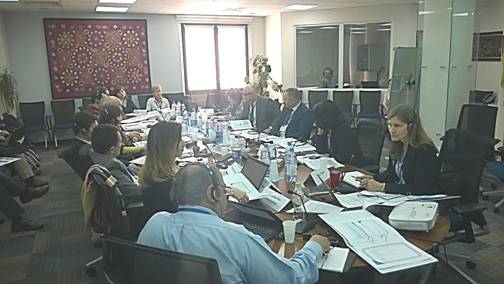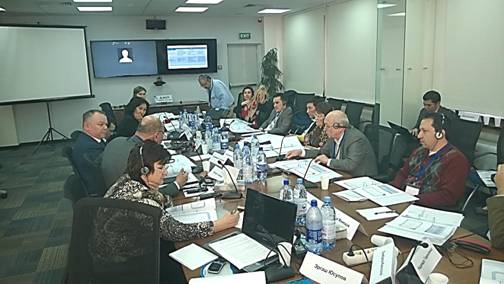THE FIRST MEETING OF THE REGIONAL WORKING GROUP ON THE WORLD BANK PROJECT ON CENTRAL ASIA WATER RESOURCES MANAGEMENT (CA-WaRM)
Vadim Sokolov, Deputy Director of the Scientific Information Center of the Interstate Commission for Water Coordination (SIC ICWC), participated in the first meeting of the Regional Working Group (RWG) under the World Bank Project on Central Asia Water Resources Management (CA-WaRM). The meeting was held at the World Bank office in Almaty, Kazakhstan on February 15-17, 2016.
The representatives of Kazakhstan, Kyrgyz Republic, and Uzbekistan took part in the meeting. Turkmenistan’s representatives participated via video conference. The representatives of Tajikistan did not take part in this meeting. The Executive Committee of the International Fund for Saving the Aral Sea (EC-IFAS), the Scientific Information Center of the Interstate Commission for Water Coordination (SIC ICWC), the Scientific Information Center of the Interstate Commission on Sustainable Development (SIC ICSD), Regional Center of Hydrology (RCH), Basin Water Organization (BWO) “Amudarya”, Basin Water Organization (BWO) “Syrdarya”, ICWC Secretariat, and Coordination Dispatch Center “Energy” represented regional organizations.


The main objective of the CA-WARM Project is to increase availability, reliability and analytical capacity to use water resources information for improved water resources planning, monitoring and management in Central Asia water organizations.
The aims of this meeting were to: (i) consider the draft Terms of Reference for the regional component of the CA-WaRM Project; (ii) discuss work tasks of the RWG; and (iii) discuss proposals to prioritize regional activities.
The Project is comprised of the three components – information, institutions, and investments.
Component A. Information.: This component will include strengthening and development of modern shared data and information platforms at the regional and national levels. This will include technical assistance and other support to:
- improve water resources monitoring (including the use of available appropriate satellite data products and services);
- modernize forecasting services (short-term and seasonal, weather, hydrological, floods, and droughts);
- facilitate wider use of data analysis, modeling and decision support systems for integrated planning (including long-term) and operational decisions;
- develop multi-media water knowledge products;
- carry out special research to fill critical gaps in knowledge; and
- improve and develop a regional information network on water resources and environmental protection.
Component B. Institutions: This component will strengthen technical capacity and develop institutional and political platforms for water resources management at the regional and national levels. This will include technical assistance, training, and other support to:
- strengthen relevant water-related organizations, harmonize standards and protocols with institutional development to implement new technologies, address challenges, and improve institutional effectiveness;
- ensure training and capacity building activities to modernize skills in water planning and management in relevant water-related organizations;
- strengthen professional networking, internship programs, and public outreach; and
- develop regional institutes responsible for water resources management, in particular, ICWC and its bodies.
Component C. Investments: This component will support implementation of investments, as well as preparation of a pipeline of new investments to support improved water resources management. This will include civil works, advanced technologies, technical assistance and other support to:
- modernize the water monitoring network (to monitor weather conditions, flows, levels, water quality, sediments, groundwater, and etc.);
- modernize office infrastructure where required (e.g. hardware and software to improve water information centers at the regional and national levels, networking, computer-based training, digital libraries, improved access to satellite data, and so on);
- undertake preparation research to attract investments of regional and national significance (e.g. hydraulic safety, modernization of monitoring systems, and water saving technologies, etc.); and
- encourage investments in infrastructure, such as automation of monitoring and water allocation systems, reconstruction and modernization of hydraulic structures, and implementation of water saving technologies, etc.).
According to the World Bank, the first phase of the CA-WaRM Project will be fulfilled within six years (starting from 2017). The financing of the first phase (grant and credit funds) will amount to US$ 90 million (at the regional and national levels). Exact amount of financing will be identified, when a detailed Project document is developed by June 2016 and submitted to the Board of Directors of the World Bank for consideration. The financing structure consists of 6 agreements on financing: one agreement for every Central Asia country, and one regional agreement for the RWG.
The participants were proposed the draft Terms of Reference for the RWG on the first day of the meeting.
The participants agreed upon the composition of the RWG. It will be comprised of national coordinators from five countries, as well as representatives of regional organizations under the aegis of IFAS. As of today, IFAS consists of an Executive Committee and two technical bodies: the Interstate Commission for Water Coordination (ICWC), which is mainly engaged in water resources management, and the Interstate Commission on Sustainable Development (ICSD), which has broader mandate focused on environmental protection. A special focus will be on the regional organizations responsible for water resources management, in particular, ICWC and its executive bodies (SIC ICWC, BWO “Amudarya” and BWO “Syrdarya”), as well as Regional Center of Hydrology of the EC-IFAS and Coordination Dispatch Center “Energy”. Thus, RWG will be comprised of 13 members (5 national representatives and 8 regional representatives).
The participants agreed that representatives of the World Bank would moderate work of the RWG. The candidature of the Regional Environmental Center for Central Asia (CAREC) as a moderator was unanimously rejected. Representatives of countries on a rotating base will chair the meetings of the RWG.
The RWG will be responsible for drafting the program of regional activities financed under the Project to improve water information and knowledge systems, as well as share information on basins more effectively, and carry out relevant analysis. The program may also address issues related to management organizations at the regional level, including financial stability and partners’ participation; decision-making process; participation of relevant organizations in decision-making; coordinated work and interaction between IFAS organizations at the regional level and between its headquarters and national branches.
The RWG will submit its ideas and recommendations to the Regional Steering Committee (RSC) for consideration and approval. The RWG will not be responsible for decision-making.
The following one and a half day, participants discussed ideas for a set of regional activities of the Project, its work schedule, and brief information on goals and criteria to support these activities. They discussed mechanisms of the Project implementation, in particular, the refinement of the Terms of Reference for the RWG.
While discussing the Terms of Reference for the RWG, representatives of the Republic of Uzbekistan (Sh.Kuchkarov and N.Gavrilenko) and the EC-IFAS (Sh.Talipov) focused on the draft practical measures within the regional component to modernize water infrastructure, including:
- construction, reconstruction and modernization of buildings and structures belonging to the national dispatch centers responsible for water forecasting, monitoring and management;
- re-equipment of the whole water accounting and management system, taking into account advanced international experience (hardware, software and communication systems).
Mr. Vadim Sokolov presented the vision of the Project realization by SIC ICWC. First of all, it is necessary to identify the main objective of the Project – strengthen cooperation between the countries on the basis of mutual benefits and compliance with the International Water Law. For this purpose, the information component should provide complete information on the available surface water resources and their variability due to climate change during the last years and for the future years. Information on the available groundwater and return water after industrial, municipal and irrigation use. It is necessary to identify water demands of river deltas and landlocked water bodies (the Aral Sea, Arnasay, etc.)
The proposed division of the Project into national part and regional part may bring desired results, if relevant mechanism of coordination between national and regional groups is developed. There already was a negative experience. The GEF Project carried out in 1998-2001 despite the substantial investments (US$ 6 million) was unsuccessful as unagreed water demands of the countries were not satisfied through water resources of the Aral Sea basin while causing damage to each other and the natural environment. From the very beginning, it should be agreed that water demands of the countries for all uses will be determined taking into account regional restrictions. These will be expressed in environmental and sanitary needs, conformity of the share of water withdrawals of each country with the control figures in the Comprehensive Master Plans for river basin use, as well as mechanisms of multi-year regulation to adapt to climate change.
Various tools and mechanisms of planning and management developed within the framework of the Project will demand relevant training of water managers, planners and heads of water users, so that these mechanisms be effective. A special focus should be on legal training that will raise awareness of water experts and stakeholders on their rights and obligations.
Proposals of representatives of Uzbekistan, SIC ICWC and other participants were discussed, when the priorities of the complex of regional activities were determined. Important results of the meeting are:
- Created positive atmosphere of cooperation during the RWG discussions and brain storm;
- Elaborated working mechanisms of the RWG
- Preliminary list of key areas of regional activities; and
- List of criteria (for prioritization of proposals).
Preliminary list of key areas of regional activities on the components determined during the meeting is the following:
On information component:
- Carry out inventory (previous activities, current condition, demands), data reconciliation, research to integrate regional data);
- Improve automated monitoring and accounting systems;
- Increase the use of satellite and remote sensing data;
- Increase reliability of forecasting (short-term, seasonal, long-term);
- Deeper understanding of basins/watersheds (catchment areas, glaciers, ecosystems, groundwater, water pollution, alternative water sources, water balance);
- Create a shared access system to data; access to information/sharing information on water resources;
- Instruments/models of data analysis and water accounting;
- On-line information system; and
- Improve knowledge products, portals, and applications.
On institutional component:
- Harmonize/unify standards/protocols/legal documents/(e.g. to monitor water resources, share data, quality of data, groundwater, water pollution, and hydraulic safety);
- Develop interactions between national and regional organizations;
- Build institutional capacity, including of departments/branches;
- Establish a modern situation center for water resources management;
- Scholarships for future water professionals;
- Hold conferences, seminars, training, and study-tours on a regular base;
- Restart coordinated scientific research and strengthen interactions with scientific society/educational networks; use regional experience;
- Coordination and synergy with other activities financed by donors; and
- Intersectoral task forces (e.g. hydraulic safety)
On investment component
- Modernization of infrastructure to monitor water resources;
- Construction/re-equipment of buildings; open public access information centers on the situation in the basin (including for two BWOs);
- Analysis of technical condition of water infrastructure and the needs for modernization (including hydraulic safety, efficiency improvement);
- Pilot projects (using global best practices), e.g. monitoring, SCADA, smart information technologies, water efficiency – for two BWOs, Chu-Talas Commission, etc.; and
- Facilitate wider use of modern information and communication technologies (software and hardware).
According to the draft Terms of Reference, recommendations for this set of activities will be submitted to the Regional Steering Committee, consisting of officials from five countries, for approval and elaboration of further guidance.
|